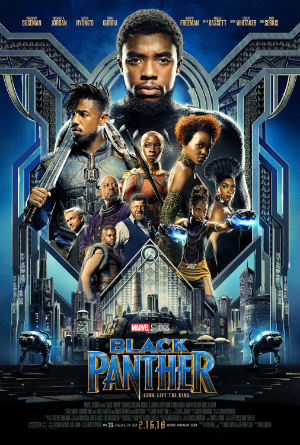 More than 50 years after his creation as a comic book character, Black Panther has finally made the leap to the big screen under the direction of Ryan Coogler. It’s a spectacular debut for the character and an impressive step forward for the director.
More than 50 years after his creation as a comic book character, Black Panther has finally made the leap to the big screen under the direction of Ryan Coogler. It’s a spectacular debut for the character and an impressive step forward for the director.
In his feature debut, Fruitvale Station, Coogler drew from real-life inspiration to recreate events that were truly infuriating and monstrously evil. He then reinvigorated the Rocky Balboa franchise with Creed by centering it around a son who has lost his father and is seeking to forge his own persona. Both films integrated social issues into their narrative fabric quite naturally, even though Creed was angled more as a sports drama.
Coogler’s increasingly confident direction ensures that Black Panther is often mesmerizing, at least in the extended scenes that lie in between its action sequences. He brings social issues to life with a firm sense of what’s at stake. Written by Coogler and Joe Robert Cole, Black Panther taps into a similar fount of familial loss and long-simmering, righteous bitterness as Coogler’s earlier efforts, and again revolves around Michael B. Jordan.
It should be noted that Jordan is playing, not the protagonist but an antagonist, an initially mysterious young man who is first seen in association with brazen criminal Orlando Klaue (Andy Serkis). By far, Jordan ends up playing the most significant, if off-putting, individual in the movie, though much of the film takes place from the perspective of T’Challa (Chadwick Boseman). His father was killed in a previous Marvel blockbuster, which means he is now expected to assume rulership in the nation of Wakanda.
In the opening moments of the film, we learn that Wakanda is one of the few places on earth where the rare metal known as vibranium can be found, enabling a rich trove of technological wonders to be developed, and enabling the country to provide all that its native citizens need (or want). To protect its own interests and prevent other nations from intruding/stealing their treasured assets, Wakanda has maintained a policy of strict secrecy about their true assets. To outsiders, Wakanda appears to be a “third-world” country, awash in poverty with nothing to offer in trade with other nations.
But on a planet where millions of disadvantaged people far outnumber the privileged few, is Wakanda’s policy safe or selfish? Is is time for revolution? Or will T’Challa follow the course endorsed by his father?
The most immediate and noteworthy feature of Black Panther is that nearly all the roles are portrayed by people of color. While there are a couple of white faces that pop up in supporting roles, they are really of no consequence to the overall narrative arc that director Coogler is telling.
That in itself is refreshing for a superhero movie, but even more important is that the story is vital, relevant, and layered. More so than other Marvel comic book movies, Black Panther is meaningful for its characters as well as to the giant world that lives outside the boundaries of Wakanda.
It’s meaningful, for example, when T’Challa must defend his right to rule without the aid of the enhanced powers that mark a superhero. It’s purely one individual pitted against another, which makes him all the more relatable. It’s meaningful that Okoye (Danai Gurira) leads the Dora Milaje, a fierce fighting force that is entirely female; they defend the throne and the nation, and their loyalty and fighting skills are not questioned.
Not that the film is entirely a sober affair. T’Challa has a good, loving relationship with his mother Ramonda (Angela Bassett) and his younger sister Shuri (Letitia Wright), a tech wiz who more than holds her own on screen, as well as Nakia (Lupita Nyong’0), a former romantic interest who remains a friend.
All the actors add their own grace notes to their performances. Really, the only area is which the film falls back a bit is in its reliance on visual effects to play a primary role in the action sequences, a common shortcoming in recent superhero movies.
Beyond that, however, Black Panther truly stands out for the strength of its dramatic convictions, which bolster its high degree of entertainment value. It’s a serious film that’s a pleasure to watch.
The film opens on Friday, February 16, in theaters throughout Dallas and the known world.
